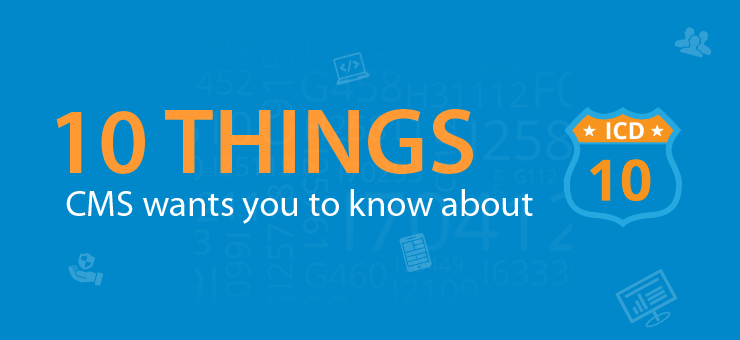Two recent updates:
- CMS has compiled a list of things you should know about ICD-10. They focus on how the transition is not as hard as it is being trumped up to be.
- CMS will run ICD-10 acknowledgment testing from June 1- 5, to give providers a chance to test their ICD-10 procedures before October. This will be the 4th testing phase so far. Any provider who submits claims electronically, can participate.
Facts about ICD-10
- The ICD-10 transition date is October 1, 2015
In short, the chances of a further delay are minuscule.
Recent Surveys on ICD-10 preparedness, for example the survey by Workgroup for Electronic Data Interchange (WEDI), have confirmed what most suspected:
The ICD-10 delay has negatively affected provider preparedness, and has further added to the transition cost.
Thus, unlike last year, do not expect last-minute legislation to delay ICD-10. ICD-10 is coming.
- You won’t be using 68,000 codes
No practice utilizes 13,000 codes in ICD-9. The same principle applies to ICD-10 as well. You will only be using a subset of the ICD-10 codes.
- There is no extensive arithmetic involved in looking up ICD-10 codes
Increase in the number of diagnosis codes does not make ICD-10 harder to use. As with ICD-9, an alphabetic index and electronic tools are available to help you with code selection.
- Outpatient and office procedure codes aren’t changing
Transition to ICD-10 does not change the Current Procedural Terminology (CPT) for Outpatient and office Coding. Your practice will continue to use the same CPT.
- All Medicare Fee-For-Service providers, have the opportunity to conduct testing with CMS before the ICD-10 transition
Your practice (if you submit claims electronically) or clearinghouse, can conduct acknowledgment testing at any time with your Medicare Administrative Contractor (MAC).
For its part, CMS will conduct acknowledgment testing from June 1-5 during which you will have access to real-time help support desk.
During testing:
- Test claims will receive the 277CA or 999 acknowledgements as appropriate, to confirm that the claim was accepted or rejected in the system
- Test claims will be subject to all current front-end edits, including edits for valid National Provider Identifiers (NPIs), Provider Transaction Access Numbers (PTANs), and for codes, including Healthcare Common Procedure Coding System (HCPCS) and place of service
- Testing will not confirm claim payment or produce a Remittance Advice (RA)
- MACs and CEDI will be staffed to handle increased call volume during this week
Testing tips:
- Make sure test files have the “T” in the ISA15 field to indicate that the file is a text file
- Send ICD-10 coded test claims that closely resemble the claims that you currently submit
- Use valid submitter ID, NPI, and PTAN combinations
- Use current dates of service on test claims (i.e. October 1, 2014, through June 1, 2015)
- Do not use future dates of service or your claim will be rejected
Contact your MAC for details about testing plans and opportunities.
- If you cannot submit ICD-10 claims electronically, Medicare has several options for you
CMS wants everyone to be prepared for, and undergo the transition successfully. Thus, Medicare has the following options for providers who know how to code in ICD-10, but are unable to submit claims with ICD-10 diagnosis codes due to problems with their systems post-October 1:
- A Free billing software that can be downloaded at any time from every Medicare Administrative Contractor (MAC).
- In about half of the MAC jurisdictions, Part B claims submission functionality on the MAC’s provider internet portal
- Submitting paper claims, if the Administrative Simplification Compliance Act waiver provisions are met
- If you take this route, be sure to allow time for you or your staff to prepare and complete training on free billing software or portals before the compliance date.
- Practices that do not prepare for ICD-10, will not be able to submit claims for services performed on or after October 1, 2015
Unless you submit claims in ICD-10 on and post-October 1, your claims will not be accepted. Moreover, be prepared to be bilingual when it comes to codes, for quite some time, after the new codes take effect.
- Any claim with a date of service before October 1 must be submitted in ICD-9, even if the claim is submitted post-October 1.
- CMS will not accept a claim with more than one code set. You must use either all ICD-9 or all ICD-10, so in some cases, you may have to split a claim ( Physician Practice).
- Reimbursement for outpatient and physician office procedures, will not be determined by ICD-10 codes
ICD-10 codes do not decide reimbursement for physician office and outpatient procedures. These claims are paid, based on CPT and HCPCS procedure codes, which are not changing. However, ICD-10-PCS codes will be used for hospital inpatient procedures, just as ICD-9 codes are used for such procedures today.
Also, ICD diagnosis codes are sometimes used to determine medical necessity, regardless of the care setting.
- Costs could be substantially lower than projected earlier
Recent studies by 3M and the Professional Association of Health Care Office Management have found, that many EHR vendors are including ICD-10 in their systems or upgrades — at little or no cost to their customers. As a result, software and systems costs for ICD-10 could be minimal for many providers.
- It’s time to transition to ICD-10
ICD-10 is foundational to modernizing health care and improving quality. ICD-10 serves as a building block, that allows for greater specificity and standardized data that can:
- Improve coordination of a patient’s care across providers over time
- Advance public health research, public health surveillance, and emergency response through detection of disease outbreaks and adverse drug events.
- Support innovative payment models that drive quality of care
- Enhance fraud detection efforts
